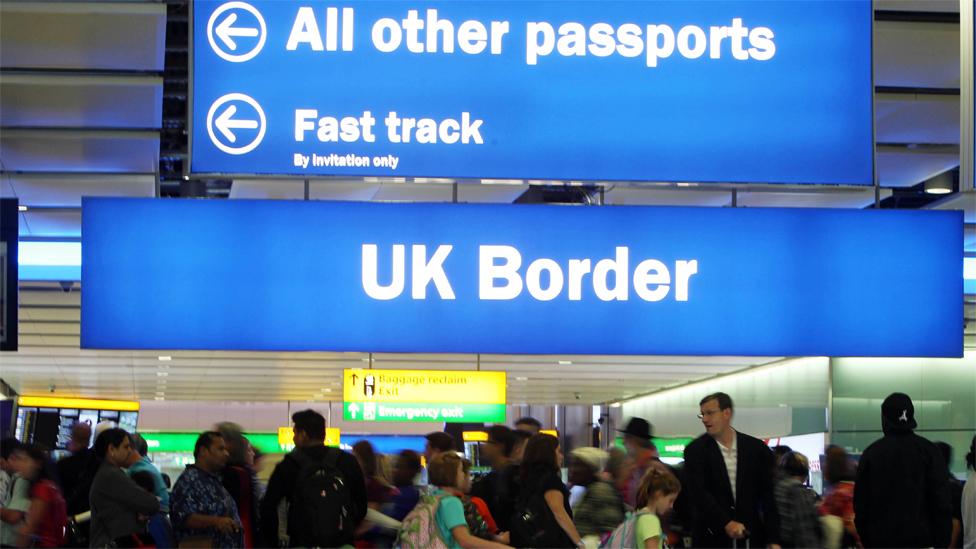Unison calls for health staff 'repayment clause' reform
- Published

One healthcare worker told BBC News NI he felt 'vulnerable and helpless'
Overseas health workers in Northern Ireland are being forced to pay thousands of pounds to quit their jobs before their contracts end, according to a trade union.
Unison said there needed to be stricter regulation of "repayment clauses" in employment contracts.
The Department of Health told BBC News NI it was working closely with the Unison on the issue.
Repayment clauses are legal under UK employment law.
The clause is designed to help with the retention of workers and recouping fees associated with overseas recruitment, such as visa sponsorship, external.
The industry body which represents the care home sector said it could cost about £11,000 to employ an overseas nurse and up to £6,000 for a care worker.
It said repayment clauses therefore provided security for employers and without them overseas recruitment would stop.
But Unison said the "unethical implementation of the clauses" was leaving overseas health workers vulnerable to exploitation.
'I felt like a slave'
One health worker, Julian, whose name has been changed to protect his identity, arrived in Northern Ireland from Africa to take up a job as a health care assistant in a private nursing home.
He said he understood and accepted that he would have to remain with the employer for a duration of three years under the repayment clause, but later became concerned about working conditions.
"I felt dehumanised," he said.
"The employer saw me as their property - because they sponsored my visa, they made me feel as if I belonged to them."
"I was supposed to get proper training but that did not happen. I couldn't phone in sick. When I did, you were told you had to put the company first.
"Even if I was to raise a grievance through the normal process - no-one was listening to me. I was so vulnerable and helpless. I felt like a slave."
Julian alleged that when he tried to hand in his notice, he was told by his employer he would have to pay them a lump sum of almost £4,000.
Evidence of this request has been seen by the BBC.

Julian speaking to BBC News NI reporter Elaine McGee
Julian said he tried to negotiate with the employer: "I was praying they would allow me to spread out the repayments.
"They said no and took my final month's salary. After they took that - I still had to pay another £1,800."
According to the Department of Health's code of practice, external on the international recruitment of health workers, any repayment clause included in an employment contact must abide by the principles of transparency, proportionate costs, timing and flexibility.
The code of practice states that examples of when a repayment clause should be waived could include where the health and wellbeing of a recruit is being adversely impacted, and where the recruit leaves due to bullying, discrimination, or poor working conditions.
'Others wanted to leave, too'
Another worker, who the BBC is calling Marie, was matched to a private care home employer by a recruitment agency.
Marie, who moved her family from Africa to Northern Ireland, said: "I never thought I would be in a position where I would want to leave the job."
"At times, there were more than 25 residents under my care alone. Whenever I tried to explain to the manager I needed training, I couldn't get it," she told BBC News NI.
Marie applied for a new job but alleged she was told by her employer she would have to pay a lump sum of more than £10,000 if she wanted to leave.
Marie said that when she handed in her notice - the company she was working for recouped some of the money through her salary.
"I went to work for two months and did not get a penny, the employer retained my full salary," she said.
"Mentally, I was very badly affected."
Marie said she ended up repaying about £6,000 and was eventually able to leave the care home and start a new job.
"Other colleagues wanted to leave but they were scared because of what happened to me and they just had to stay in poor working conditions" she said.
"There is no accountability, I am speaking out as there needs to be change."
Highest ethical standards
Nathalie Donnelly, the local organiser with the black and migrant workers project at Unison, said it was not a new issue.
However, the union also claimed an increase in the number of similar cases being reported since the Covid-19 pandemic.
"These repayment clauses however mean people have to pay a lot of money and that is more of a recent phenomenon" she said.
"People who have come to my attention are in real distress. They feel completely trapped."

Nathalie Donnelly from Unison has called for 'stricter enforcement'
"Employers need to be aware of the Department of Health code of practice and there needs to be stricter enforcement.
"It does not appear to be an issue within the Health Trusts as there seems to be closer scrutiny".
The department said it will examine what options, if any, there are in strengthening enforcement of the code", adding it was "happy to engage further with the independent sector providers".
'A balance to be struck'
Pauline Shepherd, chief executive of Independent Health and Care Providers, which represents the care home sector, said she was "worried and concerned" about the allegations.
"It's wholly unacceptable if workers grievances are not dealt with appropriately and then they found themselves in this position" she said.
Ms Shepherd said there was a balance to be struck in terms of fees that are paid out by employers.
"To employ an overseas nurse, it can cost around £11,000 - a care worker can cost up to £6,000.
"That is an amount of money the employer is paying before anyone even starts work so there has to be some type of security in place to get that payback for the employer.
"Otherwise, overseas recruitment would just stop.
"But if we could eliminate the grievances and address those employment concerns then employees would not find themselves in the situation of having to repay money."
- Published28 January 2020

- Published9 April 2021
